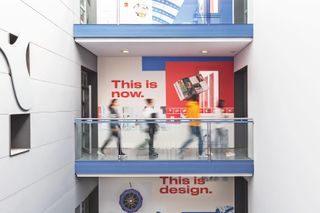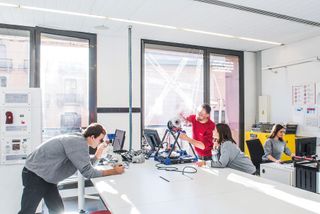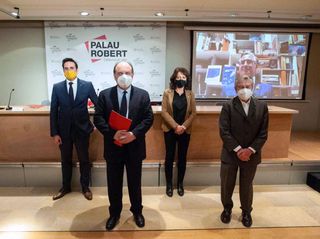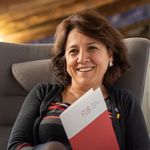This November, the Balmes University Foundation, the entity that runs the UVic-UCC, and the Elisava University School Private Foundation have signed a federative agreement by which Elisava will become a fully-fledged affiliate centre of the university. The UVic-UCC views this agreement as a factor in the growth and qualitative enrichment of its university project
Compared to academic years, 2021-2022 will begin quite differently for the Universitat de Vic – Universitat Central de Catalunya (UVic-UCC) and for Elisava, the Barcelona School of Design and Engineering. It will be the first year when they are moving forward in tandem by virtue of the federative agreement which the two institutions signed this November after months of joint preparatory work. The UVic-UCC will welcome Elisava as a university centre which will become the university’s Faculty of Design. In this way, Elisava is taking a step forward, going from an affiliated centre to a fully-fledged part of the university with the right to participate in its governing bodies. In turn, this agreement is a factor in the growth and qualitative enrichment of the UVic-UCC’s project.
Now that the contract is signed, both institutions will continue to work together to implement it. The upcoming academic year is expected to be the first in which Elisava degrees (Bachelor’s, Master’s, doctorates and in-house degrees) will be offered as UVic-UCC degrees.

A factor in the territorial balance of Catalonia
“The unique features of the UVic-UCC university model give the institution a clear public service mission and give shape to a transversal, Catalonia-wide university project which is a model of fulfilling the principle of university autonomy”, says the chair of the Balmes University Foundation (FUBalmes), Anna Erra, who is also the mayor of Vic. She further explains that the federated structure of the university “seeks to pool efforts and create synergies with other entities that have the same mission in order to foster the university’s public service so it can become an even stronger factor in the territorial balance of Catalonia”. The president of the FUBalmes views the agreement as “a factor in the growth and qualitative enrichment of the UVic-UCC university project and all its members”.
“The federated structure of the UVic-UCC seeks to pool efforts and create synergies with other entities which have the same mission so it can become an even stronger factor in the territorial balance of Catalonia”

Within this context, the chair of the Board of Elisava, Ramon Benedito, views the agreement as a step forward, as Elisava will become a federated centre and the Faculty of Design in a benchmark university: “The agreement affords Elisava the chance to participate in the governance of a unique university whose federated structure will allow it to co-participate in developing and shaping its future. Elisava will provide its transversal, multi-disciplinary design vision, meant as a broad discipline with a key impact on training, research and defining the present and future we want as a society.”
In a similar vein, the rector of the UVic-UCC, Josep Eladi Baños, views the federative agreement with Elisava as a completely natural next step: “We are bringing into the federated structure an entity with a culture that resembles ours, one with high-quality, prestigious university programmes. It is also the first design school founded in Spain almost 60 years ago, which brings a new dimension of territorial transversality stemming from the fact that the Elisava Foundation is located in Barcelona”.

Internationalisation as a strategic focus
Another cornerstone of the agreement is the strategic focus on internationalisation, which the new federation has set as a priority objective. “Both institutions share the same vision of internationalisation of our academic programmes, so we will integrate our policies in this sphere and work together to bring a global di-mension to our teaching, research and knowledge transfer”, says Rector Baños.
“We will integrate our international policies and work together to bring a global dimension to our teaching, research and knowledge transfer”

The agreement also allows each of the entities to retain management over their own cen-tres and their human and technological resources and assets, as well as their legal independence, while applying standard criteria in all areas, especially economic management, cooperative governance, the development of teaching and learning methodologies and the growth of research and knowledge transfer.
Elisava’s incorporation into the federative structure follows the addition of the Bages University Foundation in 2014 and the Foundation of Advanced Studies in Health Sciences (FESS), the entity in charge of the Faculty of Medicine, in 2016. The academic programmes currently offered at the UVic-UCC will be joined by the Bachelor’s in Design, the Bachelor’s in Industrial Design Engineering, the University Master’s in Design and Communica-tion and a broad array of Master’s and post-graduate programmes and professionalisation courses offered by Elisava.

Minister Ramon Tremosa, at the official event where the contract was signed
The agreement that brings Elisava into the UVic-UCC structure was signed by the Balmes University Foundation, the entity in charge of the university, and the Elisava University School Private Foundation on 3 November of this year at an event held at Barcelona’s Palau Robert. The federative contract was signed by the chair of the board of FUBalmes, Anna Erra, and the chair of the Board of the Elisava Foundation, Ramon Benedito, with the (remote) presence of the Minister of Enterprise and Knowledge of the government of Catalonia, Ramon Tremosa; the rector of the UVic-UCC, Josep Eladi Baños; and the secretary general of the Department of Enterprise and Knowledge, Jordi Cabrafiga.
Minister Tremosa congratulated the two entities and stated that “the agreement between Elisava and the UVic-UCC strengthens the Catalan university system and furthers its internationalisation”. Tremosa also highlighted the fact that “this agreement is an example of cooperation to join forces and help generate synergies to favour students and different regions and entities in the country”.

Elisava, 60 years training design professionals
Elisava, the Barcelona School of Design and Engineering, was founded in 1962 as the first design school in Spain. Located on Barcelona’s La Rambla, it currently has more than 2,000 Bachelor’s, Master’s and post-graduate students from 25 dif-ferent countries and 800 professors. Around 17,000 students have passed through its classrooms over its almost 60 years of history.
It offers two Bachelor’s degrees, in Design and in Industrial Design Engineering. It also offers a University Master’s in Design and Communication, the first in this field in Spain, along with an extensive range of post-graduate programmes and in-house Master’s degrees, and a wide variety of specialisation courses targeted at professionals.
Elisava defines itself as “a plural space which is fuelled by a multicultural society in constant change where innovation is urgent and utterly necessary”. Beyond the official curriculum, its teaching model leads students to “discover theories and trends, question preestablished ideas, experiment with new ways and build alternatives”.

Josep Eladi Baños, rector of the UVic-UCC
Both institutions have a very similar vision of what higher education should be like, a similar culture and a way of doing and being that is quite parallel. For both of us, this alliance is not only a chance to grow and consolidate our respective projects but also an exceptional opportunity to converge in a single, solid project with a shared, promising future. For the UVic-UCC, it means incorporating a prestigious de-sign centre with high quality university degree programmes that have important connections abroad. For Elisava, it means no longer being an affiliated centre to in-stead become a fully-fledged faculty and to join the UVic-UCC, an expanding project that encompasses Catalonia as a whole.

Anna Erra, chair of the Board of FUBalmes
The unique features of the UVic-UCC university model give the institution a clear public service mission. Bringing Elisava into the federation enables us to continue offering this service even more extensively and better, as well as reinforcing the transversal, Catalonia-wide university project that our university represents and gaining a prominent presence in the city of Barcelona. The federation enables us to join forces and create synergies with another entity with which we identify, which is pursuing the same mission we are: it is a factor in the growth and qualitative enrichment of the UVic-UCC university project and of all of us who belong to it.

Ramon Benedito, chair of the board of Elisava
Being a UVic-UCC federated centre means much more than just becoming a fully-fledged faculty. It also enables us to participate in the institution’s governance and to co-participate in developing and shaping the university and its vision. We will bring our transversal, multidisciplinary vision of design and engineering to the stra-tegic decisions taken, viewing design as a broad, open discipline that directly impacts the training, research and definition of the society that we want. Further-more, we are reinforcing a key area within Elisava, namely research and knowledge transfer, and gaining clout as a benchmark design and engineering school internationally.